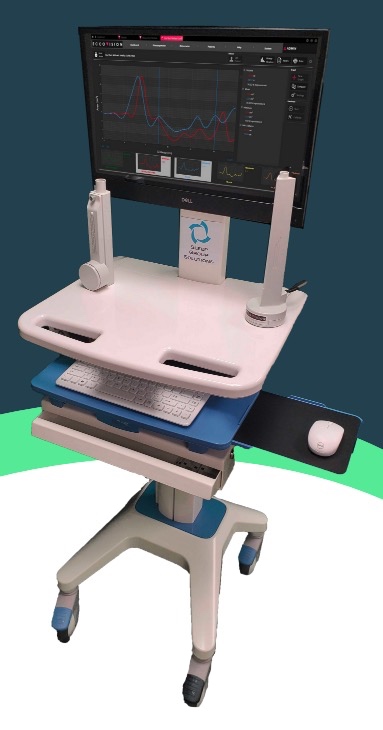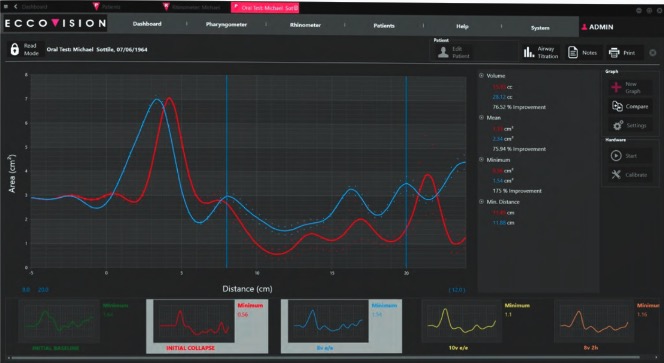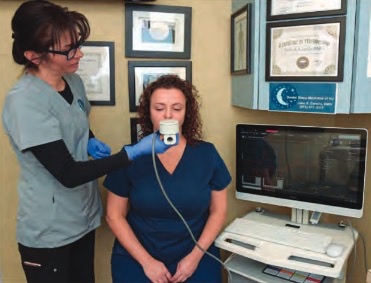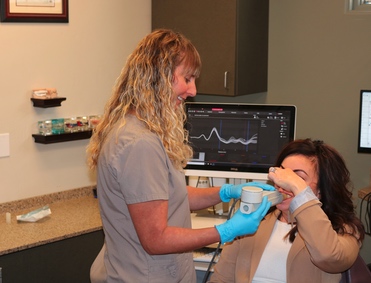Eccovision Acoustic Diagnostic Imaging System
Acoustic Pharyngometer / Rhinometer
The cornerstone of many sleep dentistry practices. The Eccovision Acoustic Diagnostic Pharyngometer and Rhinometer provides valuable information about airway size and stability. It is a highly useful tool for titrating oral appliances for sleep apnea.
More information : Eccovision Acoustic Diagnostic Pharyngometer / Rhinometer Brochure
Eccovision Clinical Research : Articles

The Eccovision Acoustic Diagnostic Imaging System
The Eccovision device uses acoustic reflection technology to accurately map out the size, structure and collapsibility of the oral and nasal airway. The Eccovision is widely used in ENT, Orthodontic and Sleep Disorders Dentistry practices.
Orthodontists can use the device to examine the health of the airway before, during and after treatment. It is well documented that a compromised nasal airway is a cause of mouth breathing which is a primary cause behind facial growth and orthodontic problems. It is critical to have accurate airway records and ability to recognize these obstructions.
 Sleep Disorders Dentists use the Pharyngometer to screen patients prior to diagnosis. A narrow airway reading on the Pharyngometer correlates to higher Apnea Hypopnea Indices once the person is diagnosed. After diagnosis the pharyngometer helps to show us how the airway changes in repsonse to mandibular advancement. It has been concluded that the pharyngometer was accurate in ruling out patients who would not benefit from oral appliances 95% of the time.
Sleep Disorders Dentists use the Pharyngometer to screen patients prior to diagnosis. A narrow airway reading on the Pharyngometer correlates to higher Apnea Hypopnea Indices once the person is diagnosed. After diagnosis the pharyngometer helps to show us how the airway changes in repsonse to mandibular advancement. It has been concluded that the pharyngometer was accurate in ruling out patients who would not benefit from oral appliances 95% of the time.
Data from Pharyngometer & Rhinometer tests is displayed on an easy-to-read graph.
Acoustic Pharyngometer
 The Eccovision® Acoustic Pharyngometer allows users to quickly and easily measure a patients pharyngeal airway size and stability from the Oral Pharyngeal Junction to the Glottis.
The Eccovision® Acoustic Pharyngometer allows users to quickly and easily measure a patients pharyngeal airway size and stability from the Oral Pharyngeal Junction to the Glottis.
The Pharyngometer graphically displays the relationship between the cross-sectional area of the airway and distance down the airway in centimeters.
Studies have shown a clear relationship between the existence of OSA and a narrow, collapsible, airway. The Pharyngometer accomplishes these measurements using acoustic reflection technology, similar to a ships sonar.
Sound waves are projected down the airway and reflected back out in such a way that the Pharyngometer software can analyze and quantify changes in the airways cross-sectional area. The test is minimally invasive and takes 2-5 minutes to complete.
Sleep Disorders Dentists use the Pharyngometer to screen patients prior to diagnosis. A narrow airway reading on the Pharyngometer correlates to higher Apnea Hypopnea Indices once the person is diagnosed. After diagnosis the pharyngometer helps to show us how the airway changes in repsonse to mandibular advancement. It has been concluded that the pharyngometer was accurate in ruling out patients who would not benefit from oral appliances 95% of the time.
Data from Pharyngometer & Rhinometer tests is displayed on an easy-to-read graph.
Acoustic Rhinometer
 The Eccovision® Acoustic Rhinometer allows for quick and easy measurements of nasal patency. The device gathers information using acoustic reflection.
The Eccovision® Acoustic Rhinometer allows for quick and easy measurements of nasal patency. The device gathers information using acoustic reflection.
Sound waves are sent up the nasal passageway and they are reflected back out in such a way that the Eccovision® Acoustic Rhinometer can accurately map out the topography of the nasal airway. This allows us to clearly identify the location and severity of any obstruction in the airway. The test is completely non-invasive and takes 30 seconds to complete.
The SGS Eccovision Acoustic Rhinometer is used daily by many ENT and pulmonary physicians as part of screening and evaluation procedures for patients who present with; Deviated Septum, Allergy, Congestion, Nasal Resistance, Nasal Polyps, Hypertrophied Turbinates and any other type of upper airway obstruction or resistance.


